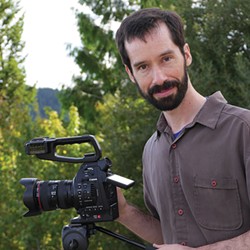Even among those of us most concerned about climate change, many have lost hope of genuine progress from the two-decade-long series of United Nations Framework on Climate Change meetings known by the acronym “COP.”
One huge disappointment was 2009’s COP15: Without a strong climate deal in Copenhagen, observers said, our odds of avoiding the worst effects of climate change would plummet.
Now comes this year’s COP21, in Paris — the latest desperate effort to save humankind from a future of ever-rising oceans, bigger storms, longer droughts, mass extinction and more.
Even among informed folk, however, optimism survives. Its herald in Pittsburgh is Mark Dixon, a climate activist and filmmaker who in July, with the blessing of Mayor Bill Peduto, represented Pittsburgh at a COP21 precursor meeting in Lyon, France.
Dixon, 40, studied industrial engineering at Stanford and then worked at Silicon Valley startups. In 2006, however, he quit to focus on green causes, especially climate change. He’s since served as a volunteer presenter for Al Gore’s Climate Project, and directed YERT — Your Environmental Road Trip, a feature-length 2011 documentary about a spirited, green-themed cross-country excursion that has screened internationally.
Next month, Dixon, like Peduto himself, heads to Paris. In recent weeks, he’s given 10 community presentations to explain why COP21 isn’t a lost cause.
As ever, says Dixon, there isn’t a moment to spare in drastically cutting our greenhouse-gas emissions. But hope remains, ironically enough, largely because the damage wrought by climate change has gotten so apparent. “The weather has transformed since COP15,” Dixon told some 70 attendees in September at Squirrel Hill’s Church of the Redeemer. “We see it every day” — from Hurricane Sandy to California’s epic drought. And by January, it’s projected, we’ll be counting 2013, 2014 and 2015 as three of the four hottest years on record globally.
So urgency is up. In September alone, Pope Francis earned headlines by raising the alarm on climate change. And 11 U.S. House Republicans defied their party’s climate-denialism by signing a resolution calling for climate action. (“The U.S. [House] and Senate are the two biggest blocks to global progress on climate,” Dixon says.) Meanwhile, opinion polls suggest that voters, historically ambivalent about climate issues, are becoming more concerned. Moreover, notes Dixon, COP21 finds more countries than ever submitting their proposed climate plans in advance.
Big obstacles remain, including the perennial divide between the rich countries that have emitted the most greenhouse gasses to date and the poor countries that are both most threatened by climate change and most likely to pursue a fossil-fueled path to wealth. But the biggest problem, Dixon says, might be fixes that are insufficiently ambitious.
COP21’s agenda assumes that we must keep global temperature increases at 2 degrees Celsius above pre-industrial levels. But experts like former top NASA climate scientist James Hansen say that even that much increase would make life on earth a nightmare. Yet to limit the increase to even 1.5 C, says Dixon, we’d have to stop emitting greenhouse gasses tomorrow; meanwhile, currently proposed emission-reduction plans aim us toward plus-3 C.
Still, Dixon thinks that limiting the temperature rise sufficiently is doable. But it’ll take a massive, worldwide, World War II-scale mobilization to increase energy conservation and efficiency, and to switch all our power to electricity generated from renewable sources. Even banking giant Citigroup, after all, recently calculated that it’ll cost us more to not act on climate change. “Any middling half-step feels like a major waste of time, energy, money,” Dixon says. (After COP, Dixon plans to report back to Pittsburgh; meanwhile, see his gofundme campaign to finance his low-budget overseas trip.)
Grant Ervin, Mayor Peduto’s chief resilience officer, admires Dixon’s work. But Ervin says Peduto’s going to Paris not only to save the planet, but to solicit business opportunities for Pittsburgh-based firms that make greener technologies, or even that offer funding mechanisms to bankroll them.
Like Dixon, Ervin acknowledges that the climate situation is daunting. But, he says, “To be in this business, you have to be an optimist.”


